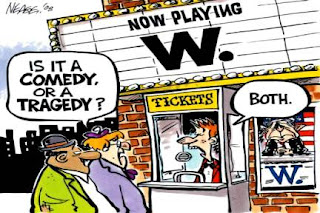
"Politics do not define a human being. There's more to people than how they vote." Who would've ever thought that these words would be uttered in an Oliver Stone film? Stone, the filmmaker with the razor-sharp bite of a political cartoon evident in such incendiary political dramas as "JFK" and "Nixon," rather audaciously chooses to put politics in the backseat of his George W. Bush biopic, "W." With its refusal to indulge in typical Stoneian melodrama and vengeful sociopolitical satire, "W." is Stone's most genius stroke of wit yet. He has truly topped himself, for what is more daring than treating Bush, one of the most universally ridiculed presidents in American history, like a human being? With the help of the terrific Josh Brolin, Stone accomplishes something truly special: he brings soulfulness to the political drama.
"W." bounces back and forth from Bush's presidency to his youth, filled with hard partying and failed jobs. This nonlinear structure makes Bush's life seem all the more surreal. Stone's shock cuts from past to present make for a dizzying experience. One sequence, for example, cuts from a young Bush confiding in his wife, Laura about the insecurity catalyzed by his father to President 'Dubya' planning a full-scale invasion of Iraq. These startling transitions inject the audience with dread and disbelief--disbelief that a man-child, party boy could go on to become the most powerful man in the world, a man with destruction at his fingertips. So, where does the soulfulness come in?
For the emotional power of this biopic journey, give credit to Josh Brolin for his sympathetic portrayal of our 43rd president. He transcends mere imitation of Bush and creates a charismatic and often tragic character. He engages the audience by portraying Bush as an everyman. He's sheepish in press conferences, quietly self-loathing in cabinet meetings. Brolin cuts through Bush's famous cocksureness, revealing his vulnerability. Most importantly, Brolin's Bush appears to be contemplating his place in the universe at all times, but especially in the film's magical closing shot in which he gazes up at the starry night sky, as if looking for answers. With this shot, Stone shows how he has changed as a filmmaker. For the first time in his career, he reveals that he doesn't have all the answers, that he can't fully cut through the darkness of the political world. The turmoil of our times is made all the more frightening and thought-provoking by his inability to reach a solid conclusion about it. Like Bush, all he can do is look up and wonder.


